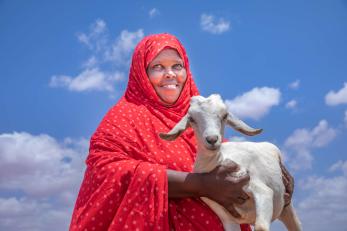Vertically Integrated Livestock Chains Enhancing Resilience In Ethiopia

As droughts in the lowlands of Ethiopia increase in frequency and severity, a key resilience capacity for livestock producers is their ability to generate income and savings from their animals, which they can use to purchase feed and other inputs when droughts strike. A major constraint is that livestock demand in the lowlands is fragmented, highly seasonal and often evaporates during dry seasons and droughts.
Through one of its interventions, the RIPA-North team aimed to transform the structure of livestock supply chains through catalysing vertical integration, with actors at each level investing in deeper relationships with their suppliers including new agent-based models. In doing so, the aim was to foster trust-based relationships that enable information flows and other embedded services between actors, reduce uncertainty and risk for regional traders and female pastoralists, and result in supply chains that are resilient to shocks such as drought and conflict.
Key achievements and indicators of success include:
- Average increase in sales per partner Goat Aggregation Enterprise (GAE - livestock trader at regional level) of 193%, with sales reaching £177,000 per quarter.
- New model of village-level last-mile mini-collectors proved hugely successful, with 107 mini-collectors still active after nearly two years (82% success rate).
- Strong evidence of self-replication through ‘crowding-in’, with 5 regional traders independently copying the business model.
- More than 11,000 households sell small ruminants to partner GAEs each quarter, a substantial increase from 4,000 households before the intervention.
- £1.8 million in livestock sales by HHs to partner GAEs each quarter.
- The new model particularly benefited women, who are primarily engaged in small ruminant production, by increasing their access to information and bargaining power. The fact that more than 50% of GAE mini-collectors are female was a key factor in this success.
Selected lessons learned and recommendations:
- Using a market systems resilience (MSR) approach was instrumental in shaping the RIPA-North vision and the systems change that the team ultimately catalysed.
- Fostering trust-based relationships had a profound impact in terms of reducing uncertainty and increasing information flows and embedded services between actors in the supply chain.
- More measurement is needed to assess the extent to which these supply chains are resilient to shocks, but the fact that livestock purchases did not fall during the peak of the recent drought (the worst in 40 years) is a positive sign.
- Weight-based purchasing became common practice for some actors, but overall significant resistance remains at household and mini-collector level.
- Mercy Corps should consider undertaking research to better understand the extent to which this intervention is catalysing a shift in pastoral production practices and marketing attitudes and practices.
